Egg float salt water
Egg Float Salt Water. Not only salt but anything that dissolves in water like sugar will also show a similar phenomenon. The egg floats because the density of the salt water changes to be greater than the egg and the density of the egg becomes less dense so then the egg floats. Place the egg in it and watch the egg sinking to the bottom of the glass. Add an egg inside a glass.
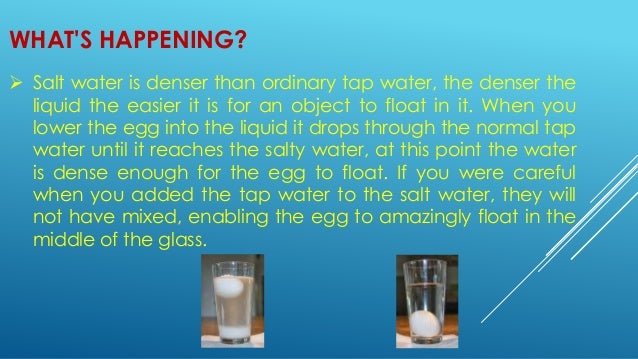 Make An Egg Float In Salt Water From pt.slideshare.net
Make An Egg Float In Salt Water From pt.slideshare.net
Not only salt but anything that dissolves in water like sugar will also show a similar phenomenon. It pushes the water particles out of the way and sinks to the bottom of the container. Fill the glass with ordinary tap water. Because salt water is denser than freshwater some things float more easily in the ocean or extremely salty bodies of the water such as the dead sea. The egg floats because the density of the salt water changes to be greater than the egg and the density of the egg becomes less dense so then the egg floats. Place the egg in it and watch the egg sinking to the bottom of the glass.
Half fill the glasses with fresh water.
Salt water is denser than ordinary tap water the denser the liquid the easier it is for an object to float in it. Stir the water in the glass to completely dissolve the salt. The egg in the salt water will sink while the one in the container with only tap water will float. It will settle in the bottom. Again place the egg back into the glass and watch the floating egg. Add an egg inside a glass.
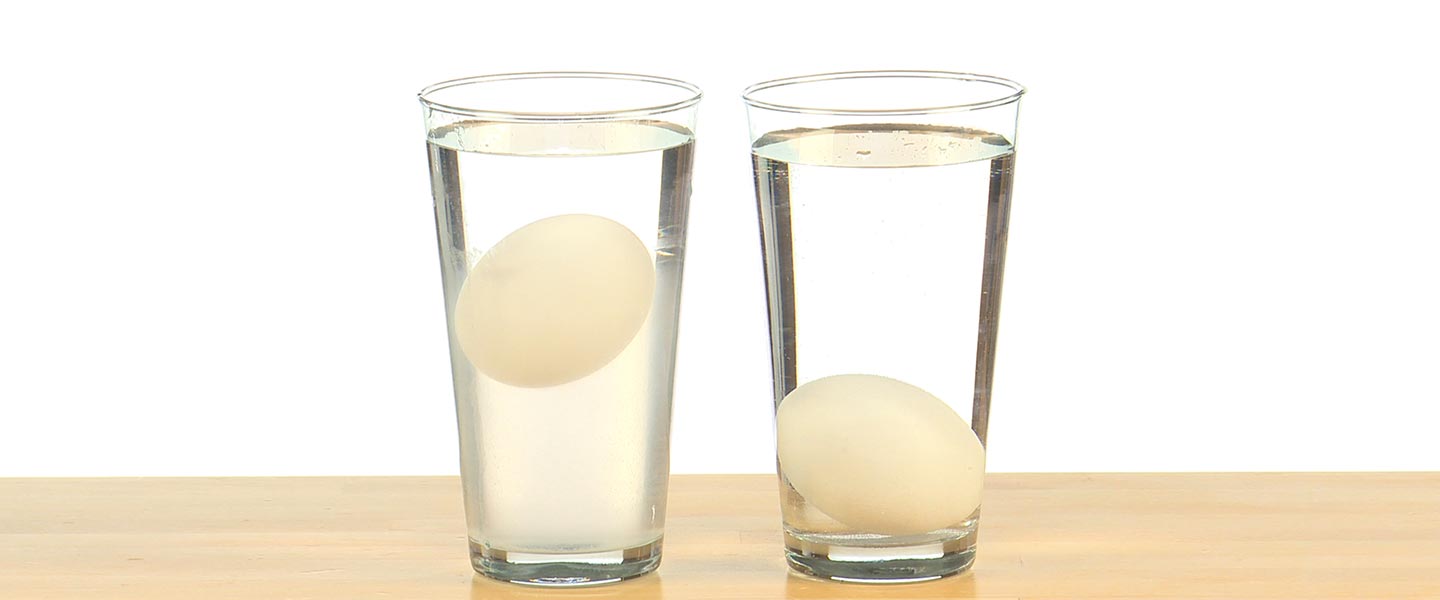 Source: stevespanglerscience.com
Source: stevespanglerscience.com
Place the egg in it and watch the egg sinking to the bottom of the glass. Half fill the glasses with fresh water. You can make your own dense water by adding. These new particles essentially hold the egg up in the water causing it to float. The egg floats because the density of the salt water changes to be greater than the egg and the density of the egg becomes less dense so then the egg floats.
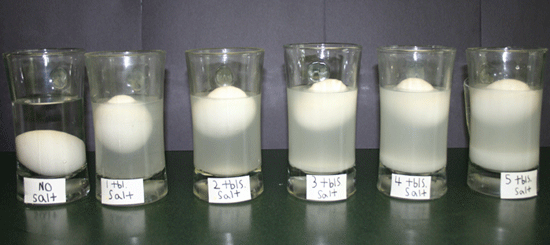 Source: ggteks.net
Source: ggteks.net
These new particles essentially hold the egg up in the water causing it to float. Again place the egg back into the glass and watch the floating egg. In the other container the salt ions and the water ions have bonded together which makes the water more dense than the egg. In this experiment the egg sinks in plain water because the egg is denser than the water. Place the egg in it and watch the egg sinking to the bottom of the glass.
 Source: youtube.com
Source: youtube.com
Not only salt but anything that dissolves in water like sugar will also show a similar phenomenon. In this experiment the egg sinks in plain water because the egg is denser than the water. Stir the water in the glass to completely dissolve the salt. The explanation behind this phenomenon is simple density. Place one egg in each of the containers and observe which one of the eggs float in the container and which one sinks.
 Source: sciencebuddies.org
Source: sciencebuddies.org
Because salt water is denser than freshwater some things float more easily in the ocean or extremely salty bodies of the water such as the dead sea. Add an egg inside a glass. Fill the glass with ordinary tap water. However the density of egg remains the same even though that of water changes. Not only salt but anything that dissolves in water like sugar will also show a similar phenomenon.
 Source: pt.slideshare.net
Source: pt.slideshare.net
Not only salt but anything that dissolves in water like sugar will also show a similar phenomenon. Again place the egg back into the glass and watch the floating egg. However the density of egg remains the same even though that of water changes. These new particles essentially hold the egg up in the water causing it to float. But when you put an egg in tapwater the density of the egg is greater than the density of the tapwater which makes the egg sink.
 Source: youtube.com
Source: youtube.com
Not only salt but anything that dissolves in water like sugar will also show a similar phenomenon. But when you put an egg in tapwater the density of the egg is greater than the density of the tapwater which makes the egg sink. In an other glass add some salt to increase the density of the water. You can make your own dense water by adding. Place the egg in it and watch the egg sinking to the bottom of the glass.
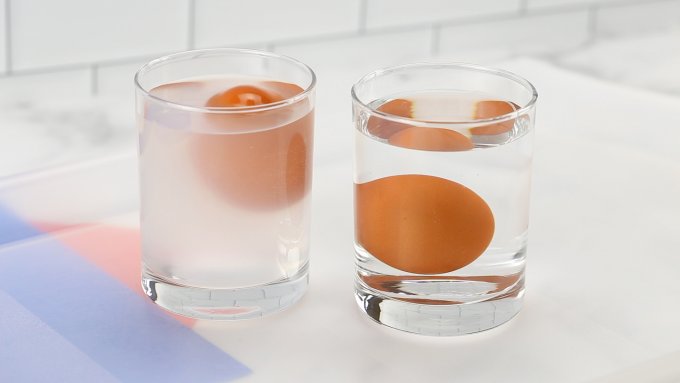 Source: littlebinsforlittlehands.com
Source: littlebinsforlittlehands.com
But when you put an egg in tapwater the density of the egg is greater than the density of the tapwater which makes the egg sink. The explanation behind this phenomenon is simple density. Fill the glass with ordinary tap water. Half fill the glasses with fresh water. Stir the water in the glass to completely dissolve the salt.
 Source: coolscienceexperimentshq.com
Source: coolscienceexperimentshq.com
Not only salt but anything that dissolves in water like sugar will also show a similar phenomenon. Not only salt but anything that dissolves in water like sugar will also show a similar phenomenon. In an other glass add some salt to increase the density of the water. As the density of salt water now is more than the density of the egg egg floats in salt water. Place the egg in it and watch the egg sinking to the bottom of the glass.
 Source: m.youtube.com
Source: m.youtube.com
It pushes the water particles out of the way and sinks to the bottom of the container. The explanation behind this phenomenon is simple density. Salt water is denser than ordinary tap water the denser the liquid the easier it is for an object to float in it. As the density of salt water now is more than the density of the egg egg floats in salt water. Place one egg in each of the containers and observe which one of the eggs float in the container and which one sinks.
 Source: giftofcuriosity.com
Source: giftofcuriosity.com
Stir the water in the glass to completely dissolve the salt. However the density of egg remains the same even though that of water changes. In the other container the salt ions and the water ions have bonded together which makes the water more dense than the egg. But when you put an egg in tapwater the density of the egg is greater than the density of the tapwater which makes the egg sink. When you lower the egg into the liquid it drops through the normal tap water until it reaches the salty water at this point the water is dense enough for the egg to float.
 Source: pinterest.com
Source: pinterest.com
However the density of egg remains the same even though that of water changes. Add an egg inside a glass. In the other container the salt ions and the water ions have bonded together which makes the water more dense than the egg. In an other glass add some salt to increase the density of the water. But when you put an egg in tapwater the density of the egg is greater than the density of the tapwater which makes the egg sink.
 Source: kidpid.com
Source: kidpid.com
Salt water is denser than ordinary tap water the denser the liquid the easier it is for an object to float in it. Place one egg in each of the containers and observe which one of the eggs float in the container and which one sinks. It pushes the water particles out of the way and sinks to the bottom of the container. Again place the egg back into the glass and watch the floating egg. In an other glass add some salt to increase the density of the water.
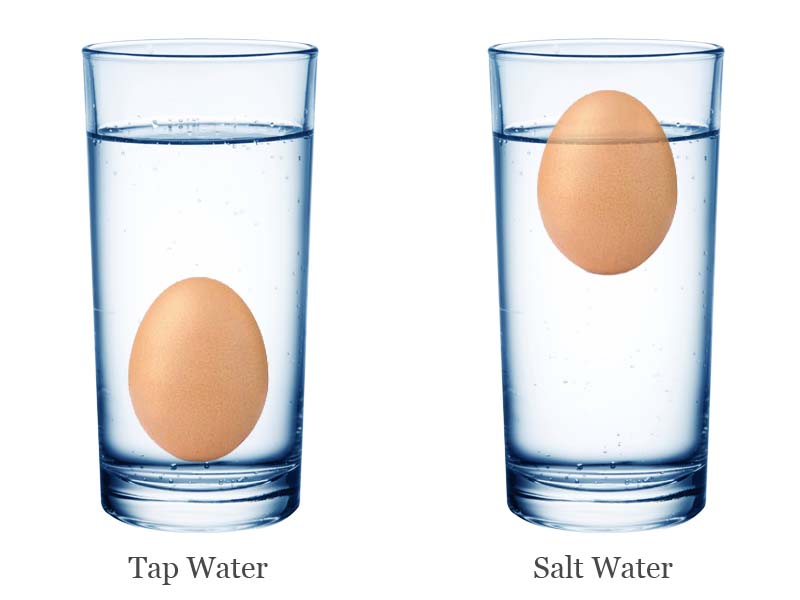 Source: science4fun.info
Source: science4fun.info
It pushes the water particles out of the way and sinks to the bottom of the container. The egg in the salt water will sink while the one in the container with only tap water will float. When you lower the egg into the liquid it drops through the normal tap water until it reaches the salty water at this point the water is dense enough for the egg to float. It pushes the water particles out of the way and sinks to the bottom of the container. These new particles essentially hold the egg up in the water causing it to float.
 Source: sciencefun.org
Source: sciencefun.org
Add an egg inside a glass. The explanation behind this phenomenon is simple density. However the density of egg remains the same even though that of water changes. In the other container the salt ions and the water ions have bonded together which makes the water more dense than the egg. But when you put an egg in tapwater the density of the egg is greater than the density of the tapwater which makes the egg sink.
 Source: pinterest.com
Source: pinterest.com
Stir the water in the glass to completely dissolve the salt. Not only salt but anything that dissolves in water like sugar will also show a similar phenomenon. Add about 6 tablespoons of salt in one container and stir it well with a tablespoon until the salt has completely dissolved in the water. When you lower the egg into the liquid it drops through the normal tap water until it reaches the salty water at this point the water is dense enough for the egg to float. Again place the egg back into the glass and watch the floating egg.
If you find this site serviceableness, please support us by sharing this posts to your preference social media accounts like Facebook, Instagram and so on or you can also save this blog page with the title egg float salt water by using Ctrl + D for devices a laptop with a Windows operating system or Command + D for laptops with an Apple operating system. If you use a smartphone, you can also use the drawer menu of the browser you are using. Whether it’s a Windows, Mac, iOS or Android operating system, you will still be able to bookmark this website.






